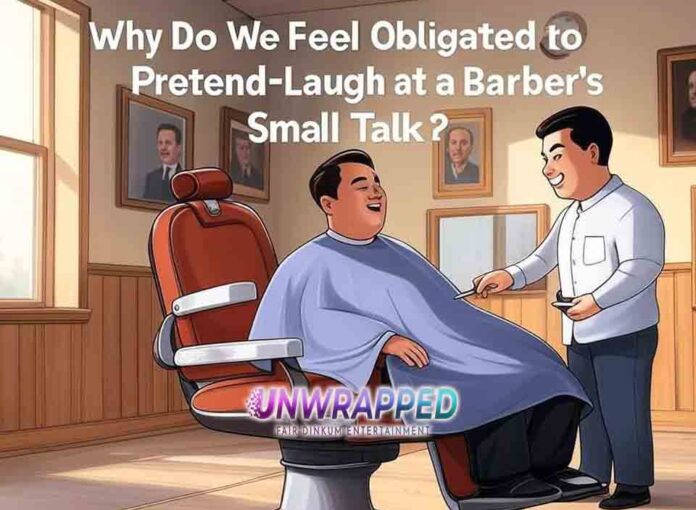The barbershop has long been more than just a place for grooming; it’s a social hub where conversations flow as freely as the clippers buzz. Engaging in small talk with barbers is a common experience, often accompanied by polite chuckles or pretend laughter at their anecdotes or jokes. But why do clients feel compelled to laugh, even when the humor doesn’t quite land?
This article delves into the psychological and social dynamics that drive this behavior. From the role of laughter in human interaction to the unique relationship between barbers and clients, we’ll explore the factors that make pretend-laughing a seemingly obligatory part of the haircut experience.
The Social Function of Laughter
Laughter as a Social Tool
Laughter is a fundamental aspect of human communication, serving various social functions beyond expressing amusement. It can signal agreement, ease tension, and foster connections between individuals. In the context of a barbershop, laughter often acts as a social lubricant, smoothing interactions and reinforcing social bonds.
Research indicates that laughter can convey social status and intentions. For instance, dominant individuals may use laughter to assert their position, while others may laugh submissively to show deference or agreement. This dynamic is evident in various social settings, including the barbershop, where clients might laugh to maintain a harmonious relationship with their barber.
Nervous and Polite Laughter
Not all laughter stems from genuine amusement. Nervous laughter, for example, is an involuntary response to stress or discomfort, often serving as a coping mechanism during awkward situations. Similarly, polite laughter is a social convention used to acknowledge someone’s attempt at humor, even if it’s not genuinely funny. These types of laughter help navigate social interactions and maintain decorum.
See Also: UFO Sightings in the Outback: Real Aliens or Too Many Beers?
The Barber-Client Relationship
A Unique Social Bond
The relationship between a barber and client is unique, characterized by regular, intimate interactions. Barbers often become confidants, engaging in personal conversations that extend beyond superficial topics. This bond creates an environment where clients may feel a sense of obligation to reciprocate friendliness, including laughing at jokes or stories.
Barbers as Informal Counselors
In many communities, barbershops serve as informal counseling centers, especially in areas where access to mental health services is limited. Barbers often listen to clients’ problems, offering advice and support. This role further deepens the barber-client relationship, making clients more inclined to maintain a positive rapport through behaviors like polite laughter.
Cultural and Psychological Factors
Display Rules and Emotional Expression
Display rules are social norms that dictate how emotions should be expressed in different situations. These rules vary across cultures and contexts, influencing behaviors like laughter. In the barbershop setting, display rules may encourage clients to laugh at a barber’s jokes as a sign of politeness and social harmony.
Social Norms and Expectations
Societal expectations often pressure individuals to conform to certain behaviors to avoid social awkwardness. In the context of a barbershop, clients may feel that not laughing at a barber’s joke could be perceived as rude or dismissive, leading them to feign amusement to uphold social norms.
The Role of Gender and Status
Gender Dynamics in Laughter
Studies have shown that gender can influence patterns of laughter in social interactions. For example, women are generally more likely to laugh in conversations, especially when interacting with men. These dynamics can play out in the barbershop, affecting how clients respond to a barber’s humor based on gender norms and expectations.
Status and Power Relations
The perceived status of the barber can also impact client behavior. Clients may view the barber as an authority figure in the grooming context, leading them to exhibit submissive behaviors like polite laughter to show respect and maintain a favorable relationship.
People Also Love: Cancel Culture, Cost of Living, and Why the World’s Gone Mad
Implications and Reflections
Understanding Social Obligations
Recognizing the social and psychological factors that drive behaviors like pretend-laughing can lead to greater self-awareness and authenticity in interactions. While it’s natural to want to maintain harmony, understanding these dynamics can help individuals navigate social situations more consciously.
Fostering Genuine Connections
Encouraging open and honest communication in settings like the barbershop can enhance the quality of interactions. Barbers and clients alike can benefit from creating an environment where genuine expressions are valued over social niceties, leading to more meaningful connections.
Call to Action
Have you ever found yourself laughing at a barber’s joke out of politeness? Share your experiences and thoughts in the comments below. For more insights into social behaviors and psychology, subscribe to our newsletter and join the conversation.
Conclusion
The subtle art of pretend-laughing at a barber’s small talk may seem like a minor social gesture, but it reveals a complex web of psychological, cultural, and interpersonal dynamics. From social norms and display rules to power relations and emotional intelligence, the obligation to laugh isn’t just about the joke—it’s about preserving harmony in a uniquely intimate setting. The barbershop acts as a microcosm of everyday human interactions where politeness, familiarity, and non-verbal cues like laughter help navigate conversations smoothly.
As researchers continue to explore the science of social behavior, it becomes increasingly clear that laughter—real or pretend—serves important functions in building trust and rapport. Recognizing why we laugh in these moments can lead to more conscious communication and even healthier relationships in similar social contexts. Whether it’s a strategic chuckle or a genuine belly laugh, the way we respond in the barber’s chair says a lot about how we connect with others—and sometimes, it’s those tiny social rituals that keep the human experience flowing seamlessly.
Another Must-Read: The Science Behind Personality Tests: Are They Accurate?











